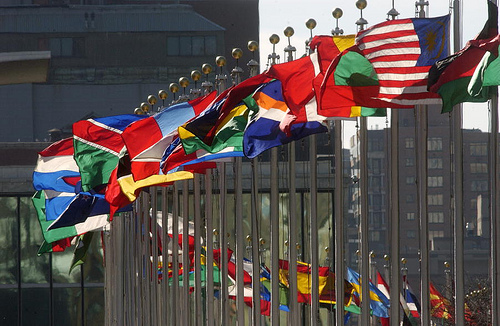Details of Fact-Finding Report on Israel Flotilla Raid Released

The relationship between Israel and the U.N. can best be described as love-hate. Israel, like other member states, reaps the rewards of membership. For example, Israeli officials have oft cited Article 51 of the U.N. Charter as a justification for their actions: “Nothing in the present Charter shall impair the inherent right of individual or collective self-defence if an armed attack occurs against a Member of the United Nations…”
Other times, government officials have condemned U.N. reports that paint Israeli actions in a negative light, like the Goldstone Report on the Gaza Conflict.
While no one can dispute that Israel and its people have come under attack more times than anyone can count in its 60-plus year existence, these events do not give Israel a free pass to ignore and violate international law.
The Human Rights Council mandated a three person independent fact-finding mission two days after the flotilla raid. The Human Rights Council appointed a retired judge of the International Criminal Court from Trinidad and Tobago; a former Chief Prosecutor of the Special Court for Sierra Leone from the United Kingdom; and a former member of the Committee on the Elimination of Discrimination Against Women from Malaysia. All highly qualified and none from a country typically seen as an enemy of Israel. The panel was not recognized by Israel, nor did Israeli officials cooperate in its investigation.
The panel determined that Israel not only violated international law during the flotilla raid, but that the Gaza blockade itself constituted a violation.
International law consists of treaties, conventions, covenants and other agreements, and it can be complex; however the major components, such as those pertaining to human rights, are fairly straightforward.
The Law of the Sea grants a state the right to create a naval blockade in international waters, such as the one implemented by Israel along Gaza. However, certain criteria must be met. The most important criteria – the blockade must have proportionality. According to the report “a blockade may not continue to be enforced where it inflicts disproportionate damage on the civilian population.”
The people of Gaza have been denied shipments of food and fuel, there has been a marked decrease in sanitation and many have been prohibited from traveling into Israel for work as a result of this blockade. Israel has also prohibited construction equipment from passing through so residents of Gaza have not been able to rebuild structures destroyed by Israeli weaponry.
Militants have launched attacks against Israel from within Gaza and Israel has the right to defend itself. However, blockading Gaza and all of its people is not a proportionate response. As such, the panel deemed the blockade and the interception raid of the flotilla illegal.
The panel cites Article 33 of the Fourth Geneva Convention, which governs the treatment of civilians in times of armed conflict: “No protected person may be punished for an offense he or she has not personally committed. Collective penalties and likewise all measures of intimidation or of terrorism, are prohibited.”
The flotilla was organized by a human rights organization called the Free Gaza Movement with the goals of drawing international public attention to the effect of the blockade on the situation in Gaza, to break the blockade and to deliver humanitarian assistance and supplies to Gaza. Israeli officials contacted the flotilla before it entered the blockaded waters, but the flotilla continued on.
The world saw what happened next; there is video evidence of soldiers shooting at the passengers. Nine civilians were killed, dozens more were injured - many seriously - and three soldiers were wounded, but this is where the differences arise.
Members of the flotilla maintain that no passenger ever fired a firearm. Israel says differently. The panel found that passengers on one boat beat the soldiers as they boarded the ship and some used knives after being fired upon from a helicopter, but the panel could find no evidence that any of the soldiers suffered gunshot wounds as Israeli officials claim.
According to the panel, the Israeli response to the flotilla was disproportionate and “it betrayed an unacceptable level of brutality.” They conclude the raid violated the following international human rights and humanitarian law provisions: willful killing, torture or inhuman treatment; willfully causing great suffering or serious injury to body or health; right to life; right to liberty and security of person and freedom from arbitrary arrest. These are not minor infractions, nor is this the first time Israel has been accused of these types of violations.
The release of this report comes at a critical time in the Israeli-Palestinian relationship. There are questions about whether Israel will continue with their settlement slowdown, which expired on Sunday, and what all of this will mean for the peace talks initiated by the State Department. State Department officials are working feverishly to maintain the talks, but optimism does not run high.
Perhaps some wisdom may be found in the closing pages of the fact-finding mission’s report: “Peace and respect have to be earned not bludgeoned out of any opponent. An unfair victory has never been known to bring lasting peace.” Here’s hoping all sides heed this lesson.
Reach Reporter Christine Detz here.
Sign up for Neon Tommy's weekly e-mail newsletter.



